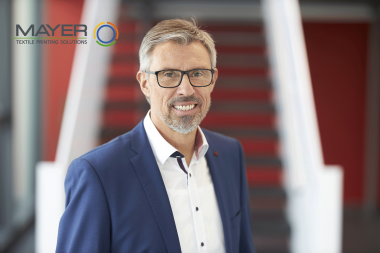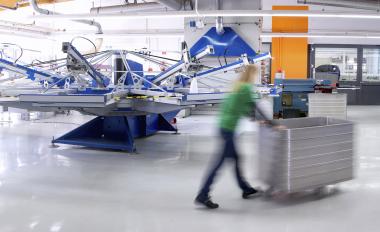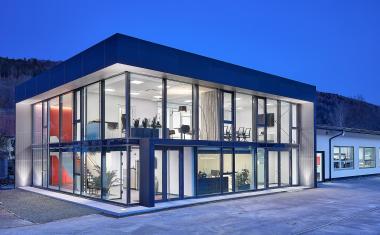„COVID-19 - We could and should have appeared better as noble knights" Michael Steidle, Textildruckerei Heinrich Mayer GmbH
- Interview with Michael Steidle, Managing Director Textildruckerei Heinrich Mayer GmbH
At least Europe seems to be able to breathe a sigh of relief after weeks of lockdown during the corona pandemic. The textile industry, an industry that has lived globalisation for so many years, is facing the challenge of maintaining its place in the new normal and building on its previous performance as quickly as possible.
Textination talked to three company representatives along the textile chain about personal and operational experiences.
The Interview with Michael Steidle, managing director at the textile printing company Heinrich Mayer GmbH, marks the provisional end of our series that started with Wolfgang Müller, Head of Sales & Services at Mayer & Cie. GmbH & Co. KG and was continued by Andreas Merkel, managing director of Gebr. Otto Baumwollfeinzwirnerei GmbH & Co. KG. The textile printing company Mayer, a family business on the Swabian Alb, is a leader in textile printing, in screen, rouleaux, rotary, sublimation and flock printing and as well as in 3D coating. They are increasingly using these skills in the area of technical textiles.
How have you felt about the corona era to date - as a company and personally?
What would you on no account want to go through again and what might you even consider maintaining on a daily basis?
The corona time hit us hard. At the beginning of April, sometimes it felt like the lights would go out within the next 24 hours. In numbers there is a drop in sales of 30 percent.
And that's not just the way we are, this crisis has incredibly broader implications. Involved in the word of the Chamber of Commerce I am concerned with many companies in the region. Sectors that would not come to mind spontaneously also feel the effects. This also includes recycling companies. After all, there is also less commercial waste when companies are on short-time work.
At a personal level you can deal with the crisis, hand hygiene, sneeze etiquette, you can learn all of this. But we miss people-to-people contacts. We have a teenage daughter; young people in particular lack the ability to be out and about with their peers.
What has the pandemic meant for your company so far?
As I said, the Corona period brought us a significant drop in sales. That means we think twice before spending money. At the beginning of the year we moved to our new, spacious company building. There are still a few small investments to be made. So far, we have put it off until the situation has calmed down again. And so do many. The economic network extremely got out of hand due to the lockdown.
We applied for short-time work, which has been running for three months now. However, you have to see how long that makes sense. Our customers also had a drop in sales, which they first of all have to recover.
What adjustments or innovations to your product portfolio have you felt obliged by the pandemic to undertake?
The mask production was a very strong topic in April and May, the phone almost rang continuously. This enabled us to compensate for many orders that were lost otherwise.
We reacted quickly, not only printing masks classically, but also developing coatings for medical face masks and protective clothing. The coatings that we offer are antibacterial and have the lotus effect. This results in the formation of droplets in the aerosols. We have had checked and certified these innovations in an urgent procedure.
We converted our machines ad hoc so that we could apply innovative coatings instead of paint. This was even possible for ready-made masks.
In general, I rate this ability to react quickly as one of our great strengths. We are a small company, so the path from idea to implementation is rather short. If we recognize a trend, an opportunity in our industry, we examine ourselves: Do we have resources that could be used or adapted to offer a solid, marketable solution in a very short time? This refers to know-how, ideas, machines and, for larger projects, also partners. Experience has shown that on the one hand we have the necessary imagination, but on the other hand we also have a fairly realistic view of ourselves. If we can answer the question with “yes”, then we get started without delay. We can evaluate a trial in the evening and continue working on it the next day. There is no need for a meeting with five persons beforehand.
What are your views on global supply chains in the future, and will you be drawing consequences for your procurement policy?
We cannot avoid global supply chains; and it will remain this way. In the short term, you may reflect on regional procurement, as far as that is still possible. Many things are simply no longer available and the development over the past 30 years cannot be turned back. Let's take pigment paint: it comes from India and China, otherwise it doesn't exist anymore. Nobody in Europe can keep the prices. And yes, that also means that the production of systemically relevant products can no longer be guaranteed.
How do you rate the importance of partnerships within the industry in the future? Does Covid-19 have the potential to promote the creation of new cooperation arrangements in the industry? Or have they already taken shape?
Existing partnerships are important. We must keep the ball rolling: Interrupted projects have to be continued with existing partners.
I think it is important to maintain partnerships at eye level. Sure, now everyone has to see how they can make ends meet. It will be shown, however, who works loyally in the long term and with respect to the business.
Personally, it is important for me to be true to my word. Only a few days ago I spoke to a student, whom we promised her internship and a corresponding payment in February. This young woman can start her internship with us; what paying is concerned, I had to tell her honestly that we have to talk about it again. Fortunately, that was not a problem. It is important to the student that she can complete the required internship at all. This is not so easy since most companies do not accept anyone right now. That is understandable too, but we will need the well-trained people again soon, that’s for sure!
What initiatives or approaches for your industry would you welcome for the near future?
I would be very interested in a positive and comprehensive description of what value added is still available in Germany. An initiative that illustrates that the textile industry is an important industry, with many companies that have been family-owned for generations, often with a young, dynamic management and high-quality products. Really nobody has that on his radar. Just today, two designers from a company nearby visited us. They were surprised which services we offer in the field of technical textiles - they were not even aware of it.
The textile industry has played itself down for a long time, that has to stop. Of course, we no longer have added value like the machine building industry. But now, in the corona crisis, it would have been the right time to take advantage of the situation and to initiate much-needed lobbying..
What would you like to see as part of the German textile industry? Do you feel that the status of the German textile industry has changed as a result of the pandemic, especially in respect of public procurement?
No, only at very short notice. Everything was taken during the crisis, the main thing was that the requested product, i.e. masks and protective clothing, was even available. Now the old cycle is back: I have a certain budget, where can I get the most for it? This is frustrating because the willingness to face this challenge was high on the part of the companies.
We also have driven the development and had our coatings for masks certified in an urgent process. Others have switched their entire production at a significant cost to meet demand. Nobody became a millionaire this way.
I think the textile industry could have sold better here. We could and should have appeared better as noble knights. Unfortunately, this was lost in the heat of the battle.
Until now the big issues have been globalisation, sustainability / climate change / environmental protection, digitisation, the labour market situation and so on. Where do they stand now and how must we rate them against the backdrop of the Covid-19 pandemic?
We take sustainability into account with our certifications, with GOTS and ISO 9001. Digitisation does not work quickly for us; it will take years before we can digitise processes. Sure, in administration we are now increasingly working with web meetings and video conferences, but personal contact is important to me. I regularly give lectures; my next one will be at the Zurich University of Applied Sciences and I very much hope that it can take place. I am just a guy for direct contact.
The labour market situation depends on the pandemic and how it develops. In any case, it remains difficult to get young people excited about textile professions. When I open a mobile phone store, I don't need a day to have my employees together. When we present ourselves at a training fair, we are happy to have a handful of good conversations.
Training is so valuable. Someone who has one will always have a different status than an unskilled person, even if - at some point - he works in a completely different branch. The dual training system is absolutely untouchable for me, because we live from this economic performance. We have nothing else but our knowledge. And we have to keep developing because only the high level gives the necessary output.
What lessons are to be learnt in respect of these targets for the post-corona era?
Innovation, innovation, innovation. You must not stand still. Nobody knows what to do next. But in three years from now I have to live from what I am developing today, just like I live from what I developed three years ago. Now, in times of Corona, it is much harder to remember, but it does not help: I can’t stand still, waiting for what is happening next, being like a deer caught in the headlights.
This interview was conducted by Ines Chucholowius, CEO Textination GmbH





